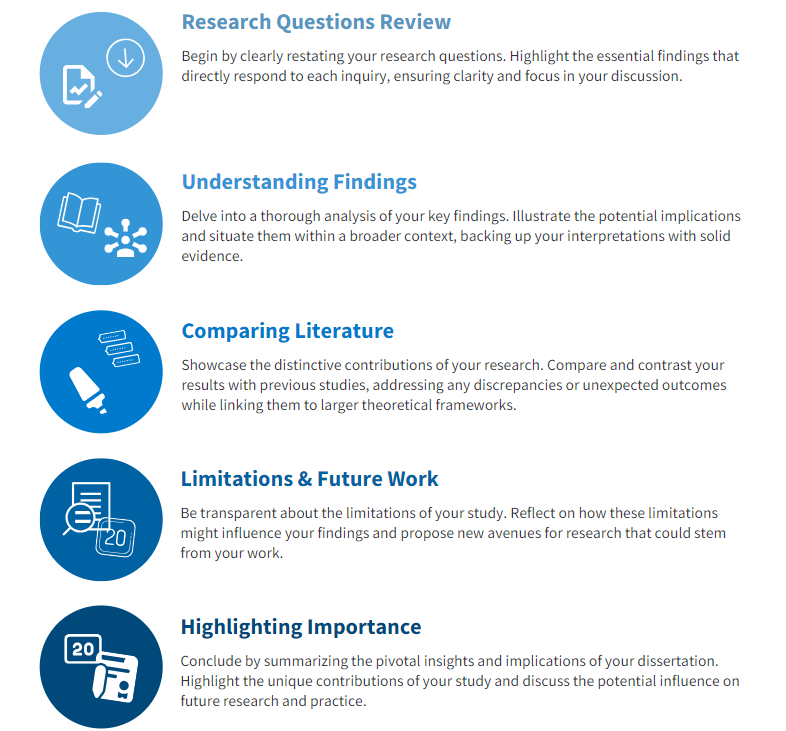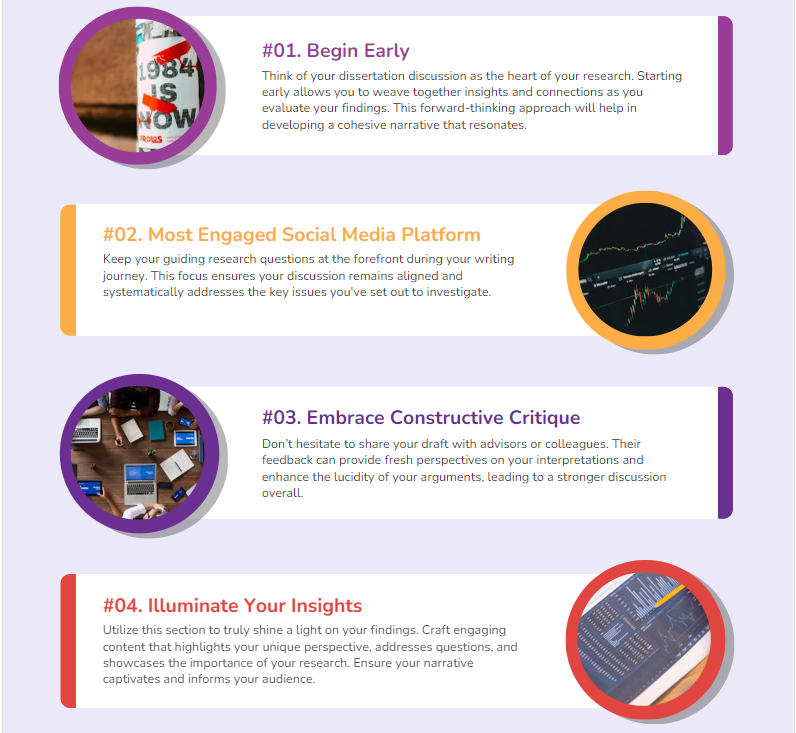The dissertation discussion section is the culmination of your academic journey. It's where you delve deeper into the significance of your findings, explore their implications, and engage in a dialogue with the broader scholarly community. Yet, crafting a compelling dissertation discussion section can be a daunting task, especially after the exhaustive effort invested in research and analysis.
This article aims to provide a comprehensive guide to writing an engaging dissertation discussion section, emphasizing clarity, coherence, and intellectual depth. By understanding the nuances of this critical chapter, you can transform your dissertation from a mere collection of data to a dynamic and thought-provoking contribution to knowledge.
Understanding the Purpose of the Dissertation Discussion Section
The dissertation discussion section goes beyond merely summarizing your findings. It serves as a platform for critical analysis, interpretation, and reflection. Its primary purpose is to:
- Connect your findings to the broader context of existing research: This involves demonstrating how your work fits into the existing body of knowledge and how it either supports, contradicts, or expands upon previous research.
- Interpret the significance of your findings: Go beyond merely stating what you found. Explore the "so what?" of your research, explaining its implications for your field, its potential practical applications, and the new questions it raises.
- Engage in a critical dialogue with your research questions: Evaluate the effectiveness of your methodology and address any limitations or unexpected results. This reflection demonstrates your analytical prowess and strengthens the credibility of your work.
- Highlight the contributions of your research: Clearly articulate the unique insights and contributions your dissertation brings to the field. This is your opportunity to showcase the value and originality of your work.
Crafting a Compelling Narrative: Structuring the Dissertation Discussion Section
While the exact structure may vary based on your field and research, a robust dissertation discussion section typically follows a clear and logical progression:
- Revisit your research questions: Begin by restating your research questions and outlining the main findings that address each one. This provides a clear foundation for the subsequent discussion.
- Interpretation of findings: Go beyond a simple summary. Analyze each significant finding in detail, explaining its potential implications and the broader context it fits within. Use evidence from your research to support your interpretations, demonstrating a deep understanding of your data.
- Comparison and contrast with existing literature: Demonstrate the unique value of your work by engaging in a critical dialogue with existing research. Highlight how your findings align with, contradict, or expand upon previous studies. Explain any discrepancies or surprising outcomes, and connect them to broader theoretical frameworks.
- Addressing limitations and future research: Acknowledge any limitations of your study and discuss their potential implications. This demonstrates your self-awareness and critical thinking skills. Additionally, propose avenues for further research based on the findings and limitations of your study.
- Highlighting the significance and contribution of your work: Conclude by summarizing the key insights and implications of your dissertation. Emphasize the unique contributions of your work to the field and its potential impact on future research and practice.

Tips for Crafting a Captivating Dissertation Discussion Section
- Maintain a clear and concise writing style: While the dissertation discussion section allows for more flexibility than other sections, avoid overly complex language or jargon. Write in a clear and concise manner, making your arguments easy to follow and understand.
- Use transitions effectively: Seamlessly connect your ideas using transitional phrases and sentences. This ensures a smooth flow of logic and strengthens the coherence of your argument.
- Support your interpretations with evidence: Use concrete examples from your research to support your interpretations and illustrate the significance of your findings.
- Engage in a critical dialogue with your research: Don't simply present your findings as definitive answers. Be willing to question your assumptions, acknowledge limitations, and explore alternative interpretations.
- Think beyond the scope of your study: Explore the broader implications of your research, connecting your findings to real-world issues and future research directions.
Avoiding the Common Pitfalls in a Dissertation Discussion Section
The dissertation discussion section is the culmination of your research journey. It’s your chance to showcase the significance of your findings, connect them to existing literature, and answer the research question that has driven your entire project. However, this crucial section can also be a breeding ground for common mistakes that can undermine the impact of your work. Here's a breakdown of the most frequent pitfalls and how to avoid them:
1. Rehashing Instead of Discussing:
The dissertation discussion section is not a retelling of your results. It's an opportunity to analyze, interpret, and contextualize your findings. Avoid simply listing your findings again; instead, focus on their implications and how they contribute to the broader body of knowledge.
2. Ignoring Limitations:
Every research project has limitations. In the dissertation discussion section, acknowledging these limitations builds credibility and shows your understanding of your work's scope. Instead of glossing over them, discuss the potential impact of each limitation on your findings and suggest areas for future research.
3. Lack of Clear Connection to Literature:
Your dissertation discussion section should be a conversation with the existing literature. Engage with relevant studies, acknowledge contrasting findings, and explain how your work adds to or challenges the existing body of knowledge. Ensure a smooth flow of information, using appropriate citations to support your arguments.
4. Overstating the Impact:
While it's important to highlight the significance of your findings, avoid overselling their impact. Focus on the specific contributions your research makes and resist making sweeping generalizations or claiming your research provides definitive answers to complex questions.
5. Ignoring Future Research Directions:
Your dissertation discussion section should not end with a final full stop. Instead, it should point towards future research directions. This can include expanding your current research, investigating new questions, or exploring the implications of your findings in different contexts.
6. Lack of Coherence and Structure:
The dissertation discussion section needs a clear structure to guide the reader. Use logical headings and subheadings to break down the discussion into manageable sections. Each section should flow seamlessly into the next, ensuring a coherent and persuasive argument.
7. Ignoring the Reader's Perspective:
Remember, the dissertation discussion section is not only for your advisor. It's meant to be read by a wider audience. Ensure your language is clear, concise, and accessible. Avoid jargon and technical terms unless necessary, and always provide context for unfamiliar concepts.
8. Ignoring Proofreading and Editing:
A well-written dissertation discussion section is essential for communicating your findings effectively. Thorough proofreading and editing are crucial to ensure clarity, accuracy, and a professional presentation.
9. Lack of Engagement with the Research Question:
The dissertation discussion section should directly address your research question. Every argument and analysis should contribute to answering this question, and the concluding paragraph should offer a clear and concise response.
10. Ignoring the Broader Implications:
Think beyond the immediate scope of your research. Discuss how your findings could contribute to real-world applications, influence policy decisions, or benefit specific communities. This broader perspective highlights the relevance and impact of your work.
Avoiding these common mistakes will help you create a compelling and effective dissertation discussion section that showcases the value of your research. Remember, this section is your opportunity to shine, to leave a lasting impression, and to make a meaningful contribution to your field. So, take the time to craft your dissertation discussion section carefully, and remember, it's a conversation, not a monologue.
Frequently Asked Questions about Dissertation Discussion Section
The dissertation discussion section is often the most daunting part of the entire writing process. After months of research and analysis, you must now synthesize your findings, interpret their significance, and connect them back to the broader field. But don't fret! Understanding the key components and common questions will help you navigate this critical stage with confidence.
1. What exactly should be included in the dissertation discussion section?
Think of this section as a conversation between your findings and the existing literature. You'll synthesize your results, highlighting key trends, patterns, and anomalies. Then, you'll analyze the implications of your findings, explaining their significance within the context of your research question and existing knowledge. You'll also address any limitations of your study and propose future directions for research.
2. How can I make my dissertation discussion section impactful?
While summarizing your findings is essential, focus on interpreting their meaning. Why are your findings important? What do they contribute to the field? Avoid simply restating the results. Instead, use them to answer your research questions, support your arguments, and engage in a critical dialogue with the existing literature.
3. What are the most common mistakes to avoid in the dissertation discussion section?
One common mistake is failing to connect your findings to your research questions. Ensure each point discussed directly relates to your research aims and objectives. Additionally, avoid making unsubstantiated claims. All interpretations should be supported by evidence from your research. Lastly, keep the tone objective and avoid overly subjective language.
4. How can I make sure my dissertation discussion section flows smoothly?
Start with a clear and concise summary of your key findings. Then, discuss each finding in detail, connecting it back to the relevant literature and research questions. Use clear transitions to guide the reader through your arguments. Ensure a smooth flow between paragraphs, and consider using subheadings to organize your discussion into logical sections.
5. What are some helpful tips for writing a strong dissertation discussion section?
- Start early: Don't wait until the last minute to begin writing this section. Begin formulating your interpretations and connections as you analyze your data.
- Revisit your research questions: Keep your research questions at the forefront of your mind as you write, ensuring your discussion directly addresses them.
- Seek feedback: Don't be afraid to share your work with your advisor or peers and get feedback on your interpretations and the clarity of your arguments.

The dissertation discussion section is where you showcase your ability to think critically and contribute to the field of study. By addressing these common FAQs and following the provided guidance, you can create a compelling and insightful discussion that leaves a lasting impression. Remember, the dissertation discussion section is not simply a summary; it's an opportunity to demonstrate your understanding of your research and its broader implications.
Elevating Your Dissertation Discussion Section to New Heights
The dissertation discussion section is the culmination of your academic journey. It allows you to showcase your intellectual depth, critical thinking skills, and the unique contribution your research makes to the field. By following the guidelines outlined in this article and avoiding common pitfalls, you can craft a captivating and impactful dissertation discussion that leaves a lasting impression on your readers. Remember, this is your opportunity to showcase your voice, interpret the significance of your findings, and engage in a thought-provoking dialogue with the academic community.
Get Professional Dissertation Writing Service
At Exemplary Dissertations, we are the academic experts that you should always engage when seeking help with dissertations. We can assist you in crafting every section of your dissertation, with a guarantee of an authentic and compelling piece. Besides dissertations, our writing services also cater for research papers, essays and case studies.